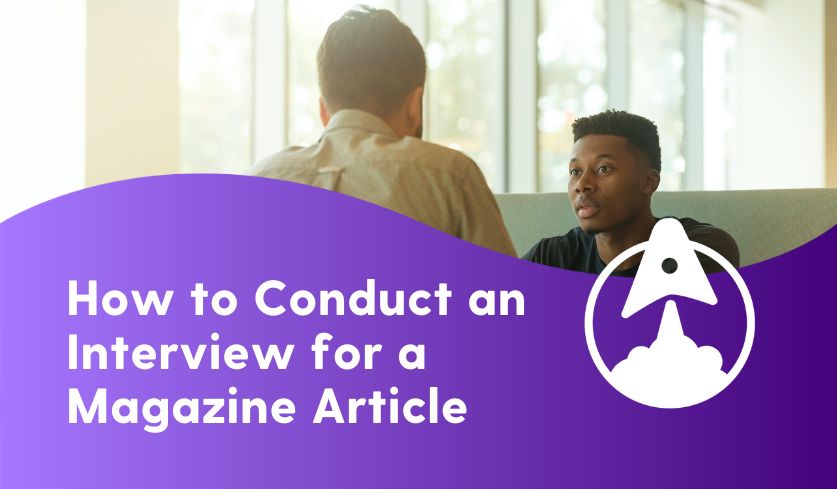It’s easy to assume that only celebrities, artists, thought leaders, and subject-matter experts sit down for interviews. That isn’t quite true, though — look at local newspapers for a great example. These papers regularly run stories with quotes from local business owners, run-of-the-mill community members, and anyone in between who’s of note to the community. Interviews are important for blogs and articles for a company, too, as they center the best soruce of information on the product or service in question.
Just about anyone can be a great interviewee (the person being interviewed) — well, when you know how to conduct an interview.
To be clear: We’re not saying there’s a one-size-fits-all approach to interviewing or that it’s like a mathematical equation. If anything, interviews might be the most dynamic, unpredictable part of the work you put in before you start writing. That said, there are a handful of tips and tricks you’ll likely find useful no matter whom you interview. We’ve assembled these into the below quick guide on how to conduct an interview for a magazine article.
6 tips and tricks for interviewing someone for an article
This guide on how to interview someone for an article focuses solely on the interview itself, not what you do before and after. With that big disclaimer out of the way, here are our hot tips for acing your magazine interview.
1. Get the right equipment — including a recording device
There are lots of tools of the trade that can help you with your interview. If you’re interviewing someone in person, you can bring a recording device, whether a separate piece of equipment or an app on your phone, along with you. There are phone call recording apps you can use to capture the best bits. Virtual interviews can take place over Zoom or another video conferencing software. You may also want to bring along a pen and paper, a note-taking app on your phone, or a laptop or tablet to take notes during the interview. No matter how you record, remember to ask permission and inform the interviewee that you’re recording the conversation.
Once you have everything you need, make sure you know how to use it all!
You’d be surprised at how often interviewers forget to turn on their recording devices — and as former journalists ourselves, we get it. In the very moments before the interview, your nerves might unexpectedly soar — it happens. Or maybe, as you’re starting your conversation with your interviewee, you get so engrossed that you forget to hit “record.” Sure, it’s a seemingly rookie mistake, but it’s a common slip-up, so: Turn on that recording device. Don’t be that person who has to ask the interview subject to redo the whole thing at a later time and date.
2. Have a script, but go off-script (well, somewhat)
Before your interview, you presumably prepared a list of questions or conversation topics. Great! But your questions and topics shouldn’t be goalposts — they should be guidelines. The questions you prepared beforehand, and the order you put them in, might make less sense — sometimes much less sense — in the moment. It’s on you to react accordingly.
Think about it like this: In your daily life, how many conversations have you had that went exactly the way you envisioned beforehand? Probably very few. The same principle applies to interviews.
3. Show the interviewee you’re paying attention
Since you’re recording audio of your interview, you might feel compelled to stay silent the whole time. Fair enough — but with that, how can you show the interviewee that you’re really listening? (This is, after all, a conversation.) The answer lies in simple facial gestures and “mmhmms.” Give all the cues you’d normally give when you’re listening to someone, and your interviewee should get pretty comfortable with you. And that’s a fast route to great sound bites.
4. Ask for clarity, and redirect when necessary
Sometimes, interviewees will give answers that might leave you scratching your head a bit. You can absolutely ask for clarity as long as you do it kindly and respectfully. The same holds true when interviewees go off on tangents — don’t cut them off, but do kindly redirect them to your question when they finish. They’ll likely be more than willing to give you a newer, better answer.
5. Don’t push the interviewee too hard
Let’s say you’re asking questions with answers that your interviewee prefers to keep private. You might sense that they’re holding back, so you might feel compelled to press them further. This is OK to do once, but if you continue to face resistance, stop. Interviewees have the right to privacy, in whatever shape that may take. You can almost certainly write a compelling article with what they do give you, even if it’s not the juicy tidbit you wanted.
6. Keep your publication’s brand in mind
A magazine’s typical tone of voice or topical focus almost always differs from that of any other magazine. The same holds true if you’re writing your story for a business’s blog — the blog will reflect the company’s brand. Your interview will thus make more sense if you keep the publication’s focus in mind during your interview. This could mean, for example, asking follow-up questions that yield answers that are more general, casual, or related to the magazine’s subject matter. It’s all about working at the intersection of your interests and the publication’s priorities.
Outsource your interviewing to the experts
Fun fact: Every interview you publish becomes a part of somebody’s content marketing strategy. You might promote the interview to show off your interviewing skills, and the interviewee might promote it to showcase their expertise. In both cases, the person sharing the article will more readily achieve their goals with high-quality content.
That, in turn, requires interviews so high-quality that professional journalists would approve — and at The Stellastra Effect, that’s exactly our content writing team’s background.
Our founder is an award-winning former journalist, and nearly all our writers and editors come from the journalism world too. Interviewing has long been the bread and butter of our work — and, as content writers, we also know how to get results. Book a consultation today to learn how our interviews and content writing get you where you’re going.






